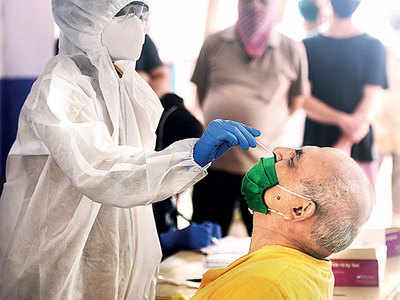
63% mortality in seniors, BMC ups screening
by Linah BaligaCivic body launches special drive in the city to document oxygen levels, comorbidities and Covid-like symptoms of everyone aged above 60
Alarmed by the exponential mortality rate among Covidpositive senior citizens, the BMC’s epidemiology cell has launched a special drive to increase screening of everyone above 60 years of age. According to BMC data, of the total number of Covidrelated deaths in the city, 63.5 per cent have been senior citizens.
As per a September 10 report by the municipality’s EPID cell, out of 22,022 Covid patients between 60 and 69 years of age, 2,276 died; in the 70-79 age group, 1,686 deaths were reported from 11,366 cases, and out of 3,768 people in the 80-89 age group, 749 succumbed to the virus.
During an earlier drive targeted at senior citizens across 24 administrative wards, less than one per cent were found with low oxygen saturation levels. Out of 9,76,941 senior citizens screened, only 3,148 were found to have oxygen saturation levels less than 95 per cent. Normal pulse oximeter readings usually range between 95 and 100 per cent. Values under 90 per cent are considered low.
Although these numbers are encouraging, old people and children remain more susceptible to the virus due to low immunocompetency and age-related comorbidities.
BMC data shows that Kurla in L-Ward has the highest senior population (3,07211), followed by K-East ward (Andheri East, 76,8080), M-East ward of Govandi (61,291) and N-Ward comprising Ghatkopar (59,964).
‘People have become negligent’
As Maharashtra continues to be among the top five contributors of Covid-19 cases in the country, health experts rue a lack of social responsibility among citizens after the easing of lockdown norms. Dr Avinash Supe, chairman of the state-appointed committee on Covid-19 and death audit said, “There has been an increase in the number of overall cases since September 1. On Friday alone, there were 2,227 cases in the city. But thankfully, the death rate has not gone up.”
Asserting that this was not a second surge, but part of the first wave itself, Dr Supe explained: “We have not had a depression, we just had low numbers. The first wave was never over. It is still a continuation of that and has only escalated.”
Dr Supe attributed the surge to more antigen tests across all wards, coupled with negligence. “People are moving out a lot and they are not wearing masks. We have to reiterate the whole exercise on social distancing and increase contact tracing,” he suggested.